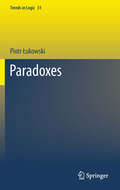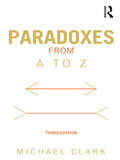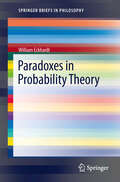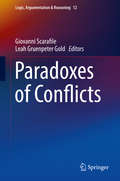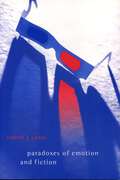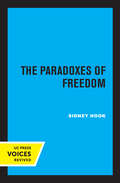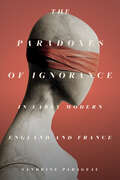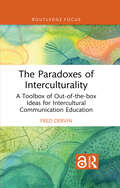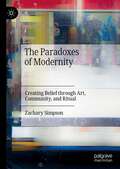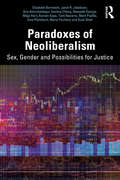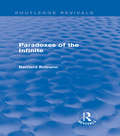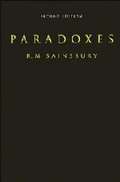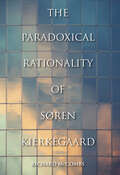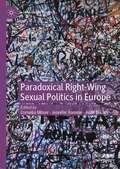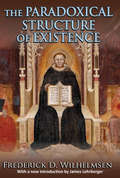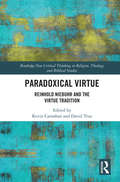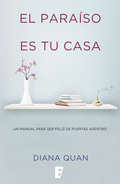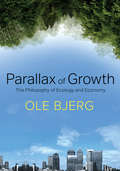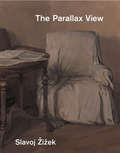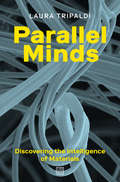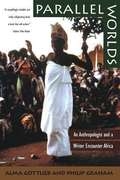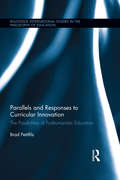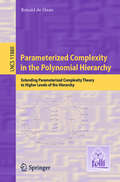- Table View
- List View
Paradoxes
by Marek Gensler Piotr ŁukowskiThis book, provides a critical approach to all major logical paradoxes: from ancient to contemporary ones. There are four key aims of the book: 1. Providing systematic and historical survey of different approaches - solutions of the most prominent paradoxes discussed in the logical and philosophical literature. 2. Introducing original solutions of major paradoxes like: Liar paradox, Protagoras paradox, an unexpected examination paradox, stone paradox, crocodile, Newcomb paradox. 3. Explaining the far-reaching significance of paradoxes of vagueness and change for philosophy and ontology. 4. Proposing a novel, well justified and, as it seems, natural classification of paradoxes.
Paradoxes and Inconsistent Mathematics
by Zach WeberLogical paradoxes – like the Liar, Russell's, and the Sorites – are notorious. But in Paradoxes and Inconsistent Mathematics, it is argued that they are only the noisiest of many. Contradictions arise in the everyday, from the smallest points to the widest boundaries. In this book, Zach Weber uses “dialetheic paraconsistency” – a formal framework where some contradictions can be true without absurdity – as the basis for developing this idea rigorously, from mathematical foundations up. In doing so, Weber directly addresses a longstanding open question: how much standard mathematics can paraconsistency capture? The guiding focus is on a more basic question, of why there are paradoxes. Details underscore a simple philosophical claim: that paradoxes are found in the ordinary, and that is what makes them so extraordinary.
Paradoxes from A to Z
by Michael ClarkParadoxes from A to Z, Third edition is the essential guide to paradoxes, and takes the reader on a lively tour of puzzles that have taxed thinkers from Zeno to Galileo, and Lewis Carroll to Bertrand Russell. Michael Clark uncovers an array of conundrums, such as Achilles and the Tortoise, Theseus’ Ship, and the Prisoner’s Dilemma, taking in subjects as diverse as knowledge, science, art and politics. Clark discusses each paradox in non-technical terms, considering its significance and looking at likely solutions. This third edition is revised throughout, and adds nine new paradoxes that have important bearings in areas such as law, logic, ethics and probability. Paradoxes from A to Z, Third edition is an ideal starting point for those interested not just in philosophical puzzles and conundrums, but anyone seeking to hone their thinking skills.
Paradoxes in Probability Theory
by William EckhardtParadoxes provide a vehicle for exposing misinterpretations and misapplications of accepted principles. This book discusses seven paradoxes surrounding probability theory. Some remain the focus of controversy; others have allegedly been solved, however the accepted solutions are demonstrably incorrect. Each paradox is shown to rest on one or more fallacies. Instead of the esoteric, idiosyncratic, and untested methods that have been brought to bear on these problems, the book invokes uncontroversial probability principles, acceptable both to frequentists and subjectivists. The philosophical disputation inspired by these paradoxes is shown to be misguided and unnecessary; for instance, startling claims concerning human destiny and the nature of reality are directly related to fallacious reasoning in a betting paradox, and a problem analyzed in philosophy journals is resolved by means of a computer program.
The Paradoxes of Art: A Phenomenological Investigation
by Alan PaskowAlan Paskow first asks why fictional characters, such as Hamlet and Anna Karenina, matter to us and how they are able to emotionally affect us. He then applies these questions to pictorial art, demonstrating that paintings beckon us to view their contents as real. Emblematic of the fundamental concerns of our lives, what we visualize in paintings, he argues, is not simply in our heads but in our world. Paskow also situates the phenomenological approach to the experience of painting in relation to methodological assumptions and claims in analytic aesthetics as well as in contemporary schools of thought, particularly Marxist, feminist, and deconstructionist.
Paradoxes of Conflicts
by Giovanni Scarafile Leah Gruenpeter GoldThis volume features more than 25 papers that were presented at the 2014 Conference of the International Association for the Study of Controversies, IASC, held at the University of Salento, Lecce, Italy. It looks at conflict and conflict resolution from diverse perspectives, including philosophy, psychology, law, and history. Coverage explores the paradox of conflict and examines how discord, whether large or small, international or internal, can be both a source of chaos as well as a foundation for unity, a limitation of potential as well as an entryway to a greater depth of living. Inside, readers will discover thought-provoking answers to such questions as: What are the conditions to ensure that a conflict can be converted into cooperation? If the conflict between interests can be solved by a compromise, what happens when a conflict involves non-negotiable values? In the management of a conflict, what role is played by argumentation? What are the latest perspectives in conflict management? How does the theory of controversies allows us to recognize and resolve conflicts? By the end of the book, readers will have a better understanding of how conflict can be transcended and how it's possible to redefine the conflicting situation so that what seemed incompatible and locked may, in fact, open a new perspective.
Paradoxes of Emotion and Fiction (G - Reference, Information and Interdisciplinary Subjects)
by Robert J. YanalHow can we experience real emotions when viewing a movie or reading a novel or watching a play when we know the characters whose actions have this effect on us do not exist? This is a conundrum that has puzzled philosophers for a long time, and in this book Robert Yanal both canvasses previously proposed solutions to it and offers one of his own.First formulated by Samuel Johnson, the paradox received its most famous answer from Samuel Taylor Coleridge, who advised his readers to engage in a "willing suspension of disbelief." More recently, philosophers have argued that we are irrational in emoting toward fiction, or that we do not emote toward fiction but rather toward factual counterparts, or that we do not have real but only quasi-emotion toward fiction, generated by our playing games of make-believe. All of these proposed solutions are critically reviewed.Finding these answers unsatisfactory, Yanal offers an alternative, providing a new version of what has been dubbed "thought theory." On this theory, mere thoughts not believed true are seen as the functional equivalent of belief at least insofar as stimulating emotion is concerned. The emoter's disbelief in the actuality of components of the thoughts must be rendered relatively inactive. Such emotion is real and typically has the character of being richly generated yet unconsummated.The book extends this theory also to resolving other paradoxes arising from emotional response to fiction: how we feel suspense over what comes next in a story even when we are re-reading it for a second or third time; and how we take pleasure in narratives, such as tragedy, that excite unpleasant emotions such as fear, pity, or horror.
The Paradoxes of Freedom
by Sidney HookThis title is part of UC Press's Voices Revived program, which commemorates University of California Press’s mission to seek out and cultivate the brightest minds and give them voice, reach, and impact. Drawing on a backlist dating to 1893, Voices Revived makes high-quality, peer-reviewed scholarship accessible once again using print-on-demand technology. This title was originally published in 1962.
The Paradoxes of Ignorance in Early Modern England and France
by Sandrine ParageauIn the early modern period, ignorance was commonly perceived as a sin, a flaw, a defect, and even a threat to religion and the social order. Yet praises of ignorance were also expressed in the same context. Reclaiming the long-lasting legacy of medieval doctrines of ignorance and taking a comparative perspective, Sandrine Parageau tells the history of the apparently counter-intuitive moral, cognitive and epistemological virtues attributed to ignorance in the long seventeenth century (1580s-1700) in England and in France. With close textual analysis of hitherto neglected sources and a reassessment of canonical philosophical works by Montaigne, Bacon, Descartes, Locke, and others, Parageau specifically examines the role of ignorance in the production of knowledge, identifying three common virtues of ignorance as a mode of wisdom, a principle of knowledge, and an epistemological instrument, in philosophical and theological works. How could an essentially negative notion be turned into something profitable and even desirable? Taken in the context of Renaissance humanism, the Reformation and the "Scientific Revolution"—which all called for a redefinition and reaffirmation of knowledge—ignorance, Parageau finds, was not dismissed in the early modern quest for renewed ways of thinking and knowing. On the contrary, it was assimilated into the philosophical and scientific discourses of the time. The rehabilitation of ignorance emerged as a paradoxical cornerstone of the nascent modern science.
The Paradoxes of Interculturality: A Toolbox of Out-of-the-box Ideas for Intercultural Communication Education (New Perspectives on Teaching Interculturality)
by Fred DervinOffering a unique reading experience, this book examines the epistemologies of interculturality and explores potential routes to review and revisit the notion anew.Grounded in different sociocultural, economic and political perspectives around the world, interculturality in education and research bears a paradoxical attribute of 'contradictions' and 'inconsistencies', making it a polysemous and flexible notion that has no definitive diagnosis and requires constant unthinking and rethinking. The author provides a toolbox of 'out-of-box ideas' in the form of fragmental yet standalone writings and follow-up questions concerning stereotypes about the very notion of interculturality and conceptual and methodological flaws in the way it is used. Readers are encouraged to critically reflect about interculturality as it stands today in global research and education. In identifying the paradoxes of interculturality and proposing alternative directions, the book stimulates a diversity of thoughts about the notion that goes beyond the 'West'. The book will be an essential reading for scholars, students and educators interested in education philosophy, applied linguistics and the broad field of intercultural communication education.
The Paradoxes of Modernity: Creating Belief through Art, Community, and Ritual
by Zachary SimpsonA paradox lies at the heart of modernity: the simultaneous demand to create ideas to make us better humans and communities, along with the contrary imperative that we criticize all ideals, especially the ones we have created. In philosophy we see this paradox most acutely in figures like Immanuel Kant, who states that we cannot know the essence of things and yet we must retain old ideas – God, freedom, and the soul – in order to become better and more ethical humans. Or in Friedrich Nietzsche, whose eternal recurrence, a self-created myth whose sole purpose is to get us to see the value in the everyday. This basic scheme – belief and un-belief – is one of the fundamental elements of modernity, manifesting itself in the philosophies of Herbert Marcuse and Michel Foucault, along with the theologies of Blaise Pascal, C.S. Lewis, William James, Sallie McFague, and Philip Clayton.How do we live out the values we know to be constructions? This question holds captive our ability to solve public goods problems and make our lives more meaningful. Instead of seeing this paradox of modernity as self-deception or bad faith, Zachary Simpson employs cognitive and social scientific research to explain how best to realize values that we know to be false: through art, community, and ritual. In Simpson's account, the values we construct must conform to narrative, be reinforced through community, and habituated through ritual. And yet modernity has also undermined collectivity and ritual. Thus arises the second paradox of modernity: the best tools we have for realizing values are those which devalue the individual modern subject.The last part of the book attempts to make three normative points regarding modernity. First, the modern, individualist subject is insufficient to realize the very values and aspirations of modernity. We must recognize that humans are collective and communal. Second, we cannot simply create values – they must arise in communities and be realized through narrative and ritual. And, third, if we are to live meaningful lives as contemporary meta-ethicists and positive psychologists argue, then such lives must include art, community, and ritual as a way to affirm and reinforce one’s values.Let’s Pretend is a statement about one of the dilemmas of the contemporary western world and how that dilemma is, and might be, resolved. How do we believe in the values that we know will make a better world, even if they are of our own making? We must do so, in part, by becoming less modern, by engaging with one another and imagining more.The book should serve as both an essay in the history of Western thought as well as a constructive argument about the nature of the modern epoch and what resources we have to realize the central aspirations of modernity. It aims to fill a critical lacuna in theoretical and philosophical approaches to modernity. While most texts focus on either the need for created values or the need to remedy modern subjectivity, few, if any, link the two problems together. Moreover, they do not ground their analyses in the social sciences and contemporary findings regarding the efficacy of narrative, communal action, and rituals.The book is unique, then, because it asks a central question – how do we believe in what we know to be false? – and because it answers this question using interdisciplinary methods that allow us to see the faultlines and paradoxes of our age.
Paradoxes of Neoliberalism: Sex, Gender and Possibilities for Justice (Social Justice)
by Janet Jakobsen and Elizabeth BernsteinFrom the rise of far-right regimes to the tumult of the COVID-19 pandemic, recent years have brought global upheaval as well as the sedimentation of longstanding social inequalities. Analyzing the complexities of the current political moment in different geographic regions, this book addresses the paradoxical persistence of neoliberal policies and practices, in order to ground the pursuit of a more just world. Engaging theories of decoloniality, racial capitalism, queer materialism, and social reproduction, this book demonstrates the centrality of sexual politics to neoliberalism, including both social relations and statecraft. Drawing on ethnographic case studies, the authors show that gender and sexuality may be the site for policies like those pertaining to sex trafficking, which bundle together economics and changes to the structure of the state. In other instances, sexual politics are crucial components of policies on issues ranging from the growth of financial services to migration. Tracing the role of sexual politics across different localities and through different political domains, this book delineates the paradoxical assemblage that makes up contemporary neoliberal hegemony. In addition to exploring contemporary social relations of neoliberal governance, exploitation, domination, and exclusion, the authors also consider gender and sexuality as forces that have shaped myriad forms of community-based activism and resistance, including local efforts to pursue new forms of social change. By tracing neoliberal paradoxes across global sites, the book delineates the multiple dimensions of economic and cultural restructuring that have characterized neoliberal regimes and emergent activist responses to them. This innovative analysis of the relationship between gender justice and political economy will appeal to: interdisciplinary scholars in social and cultural studies; legal and political theorists; and the wide range of readers who are concerned with contemporary questions of social justice.
Paradoxes of the Infinite (Routledge Revivals)
by Bernard BolzanoParadoxes of the Infinite presents one of the most insightful, yet strangely unacknowledged, mathematical treatises of the 19th century: Dr Bernard Bolzano’s Paradoxien. This volume contains an adept translation of the work itself by Donald A. Steele S.J., and in addition an historical introduction, which includes a brief biography as well as an evaluation of Bolzano the mathematician, logician and physicist.
Paradoxes (Second Edition)
by R. M. SainsburyA paradox can be defined as an unacceptable conclusion derived by apparently acceptable reasoning from apparently acceptable premises. Unlike party puzzles or brain teasers, many paradoxes are serious in that they raise serious philosophical problems, and are associated with crises of thought and revolutionary advances. To grapple with them is not merely to engage in an intellectual game, but to come to grips with issues of real import. The second, revised edition of this intriguing book expands and updates the text to take account of new work on the subject. It provides a valuable and accessible introduction to a range of paradoxes and their possible solutions, with questions designed to engage the reader with the arguments and full bibliographical references to both classic and current literature on the topic.
The Paradoxical Rationality of Søren Kierkegaard
by Richard MccombsSøren Kierkegaard deliberately feigned irrationality in many of his pseudonymous writings in order to present a rational argument about reason and faith. Richard McCombs posits that Kierkegaard's strategy of revealing the philosophical and religious underpinnings of his thought was both instructive and misguided. Focusing on pseudonymous works by Johannes Climacus and Anti-Climacus, McCombs discusses Kierkegaard's irrationality and the manner in which it bolsters important truths about rationality. He reveals Kierkegaard striving for a single, integrated self that thinks, feels, wills, acts, and communicates with purpose. This fresh reading of Kierkegaard engages an essential problem in the philosophy of religion--the difference between what is understood by reason and what must be taken on faith.
Paradoxical Right-Wing Sexual Politics in Europe (Global Queer Politics)
by Cornelia Möser Jennifer Ramme Judit TakácsHow did far-right, hateful and anti-democratic ideologies become so successful in many societies in Europe? This volume analyses the paradoxical roles sexual politics have played in this process and reveals that the incoherence and untruthfulness in right-wing populist, ultraconservative and far-right rhetorics of fear are not necessarily signs of weakness. Instead, the authors show how the far right can profit from its own incoherence by generating fear and creating discourses of crisis for which they are ready to offer simple solutions. In studies on Poland, Hungary, Spain, Italy, Austria, Ireland, Northern Ireland, Portugal, France, Sweden and Russia, the ways far-right ideologies travel and take root are analysed from a multi-disciplinary perspective, including feminist and LGBTQI reactions. Understanding how hateful and antidemocratic ideologies enter the very centre of European societies is a necessary premise for developing successful counterstrategies.
The Paradoxical Structure of Existence
by Frederick D. WilhelmsenFor metaphysicians who have imbibed the sober and inebriating teachings of Thomas Aquinas, existence is an act, the act which makes all things actually to be. As the act of existence makes things to be, essence makes them to be what they are. Essence and the act of existence, in other words, are really distinct yet together they compose each of the things that are.Such an understanding involves a number of paradoxes, and Frederick D. Wilhelmsen's articulation of them reveals his philosophical genius. These paradoxes include the fact that the act of existence does not exist, that it can be thought but not conceived by the mind, and that truths about God can be known while He himself remains absolutely unknown. Wilhelmsen argues the notion that the Christian faith and philosophical reason harmonize while remaining completely distinct from each other.Writing in a captivating style, Wilhelmsen begins with a discussion of the development, strengths, and limitations of the ancient Greek philosophical accounts of being. Following that, he develops such key topics as the problem of existence, St. Thomas Aquinas' understanding of being, critical analyses of Hegel's and Heidegger's doctrines of being, existence as "towards God," and a metaphysical approach to the human person. The final two chapters develop the sense in which metaphysical thinking is and is not shaped by historical and social factors.
Paradoxical Virtue: Reinhold Niebuhr and the Virtue Tradition (Routledge New Critical Thinking in Religion, Theology and Biblical Studies)
by Kevin Carnahan David TrueAfter the re-emergence of the tradition of virtue ethics in the early 1980s Reinhold Niebuhr has often served as a foil for authors who locate themselves in that tradition. However, this exercise has often proved controversial. This collection of essays continues this work, across a wide range of subjects, with the aim of avoiding some of the polemics that have previously accompanied it. The central thesis of this book is that putting the work of Reinhold Niebuhr and Christian realism in dialogue with contemporary virtue theory is a profitable undertaking. An introductory essay argues against locating Niebuhr as a consequentialist and in favour of thinking of his work in terms of a dispositional ethics Contributors take different positions on whether Niebuhr’s dispositional ethics should be considered a form of virtue ethics or an alternative to virtue ethics. Several of the articles relate Niebuhr and Christian realism to particular virtues. Throughout there is an appreciation of the ways in which any Niebuhrian approach to dispositional ethics or virtue must be shaped by a sense of tragedy, paradox, or irony. The most moral disposition will be one which includes doubts about its own virtue. This volume allows for a repositioning of Niebuhr in the context of contemporary moral theory as well as a rereading of the tradition of virtue ethics in the light of a distinctly Protestant, Christian realist and paradoxical view of virtue. As a result, it will be of great interest to scholars of Niebuhr and Christian Ethics and scholars working in Moral Philosophy and the Philosophy of Religion more generally.
El paraíso es tu casa: Un manual para ser feliz de puertas adentro
by Diana QuanNo hay nada como el hogar. De nosotros depende que sea como queremos. Y si bien es cierto que inevitablemente acaba siendo una manifestación de nuestra personalidad, también lo es que con una preparación adecuada, una estrategia relativa a los objetivos claros, tenacidad, rigor y buena voluntad, podemos cambiar el estilo del lugar donde vivimos. Y, al mismo tiempo, nos cambiaremos también un poco a nosotros mismos. De hecho, no hay ninguna transformación que introduzcamos en nuestro entorno que no nos afecte de manera directa, así como a nuestras actividades cotidianas. Este libro habla precisamente de todo esto y de mucho más. Concebido como una guía, encontraremos en él información para saber qué dice de nosotros nuestro hogar; orientación sobre los cambios que podemos hacer para transformarlo a fin de obtener el mayor bienestar; las características de cada estancia para saber cuáles generan vitalidad, relax o concentración e inspiración; consejos para sanar o mejorar nuestro estado de ánimo a través del sitio en que vivimos, con elementos tan sencillos como la luz, las plantas y los colores; técnicas para conseguir llenar de positividad nuestra vivienda; detalles prácticos sobre los mejores materiales para crear un hogar saludable; ideas para conseguir que en él reinen siempre la armonía y la tranquilidad.
Parallax of Growth: The Philosophy of Ecology and Economy
by Ole BjergParallax of Growth explores the ideas of economy and ecology and the factors that have put them on a collision course. Bjerg argues that our current mode of economic organization is characterized by an inherent ?debt drive?, whereby the creation of money through the issuance of commercial bank credit has locked our economy into a vicious circle of forced growth and increasing debt. Parallax of Growth is not a catalogue of solutions to the ecological or the economic crisis. The book aims to shift the inquiry from ?what shall we do?? to ?why have we not already done it?? In order to address the challenges of our contemporary times of crisis, we need to understand how the idea of growth is deeply ingrained in the ideology as well as the organization of our society. The book aims to open the space for philosophical thinking about this important issue.
The Parallax View (Short Circuits)
by Slavoj ZizekIn Žižek's long-awaited magnum opus, he theorizes the "parallax gap" in the ontological, the scientific, and the political—and rehabilitates dialectical materialism. The Parallax View is Slavoj Žižek's most substantial theoretical work to appear in many years; Žižek himself describes it as his magnum opus. Parallax can be defined as the apparent displacement of an object, caused by a change in observational position. Žižek is interested in the "parallax gap" separating two points between which no synthesis or mediation is possible, linked by an "impossible short circuit" of levels that can never meet. From this consideration of parallax, Žižek begins a rehabilitation of dialectical materialism. Modes of parallax can be seen in different domains of today's theory, from the wave-particle duality in quantum physics to the parallax of the unconscious in Freudian psychoanalysis between interpretations of the formation of the unconscious and theories of drives. In The Parallax View, Žižek, with his usual astonishing erudition, focuses on three main modes of parallax: the ontological difference, the ultimate parallax that conditions our very access to reality; the scientific parallax, the irreducible gap between the phenomenal experience of reality and its scientific explanation, which reaches its apogee in today's brain sciences (according to which "nobody is home" in the skull, just stacks of brain meat—a condition Žižek calls "the unbearable lightness of being no one"); and the political parallax, the social antagonism that allows for no common ground. Between his discussions of these three modes, Žižek offers interludes that deal with more specific topics—including an ethical act in a novel by Henry James and anti-anti-Semitism. The Parallax View not only expands Žižek's Lacanian-Hegelian approach to new domains (notably cognitive brain sciences) but also provides the systematic exposition of the conceptual framework that underlies his entire work. Philosophical and theological analysis, detailed readings of literature, cinema, and music coexist with lively anecdotes and obscene jokes.
Parallel Minds: Discovering the Intelligence of Materials
by Laura TripaldiInsights into the intelligence throughout the natural and technical environment, in the fabric of our devices and dwellings, in our clothes, and under our skin.Is there a way to understand the materials that surround us not as passive objects, but as other intelligences interacting with our own? In Parallel Minds, expert in materials science and nanotechnology Laura Tripaldi delivers not only detailed insights into the properties and emergent behaviors of matter as revealed by state-of-the-art chemistry, synthetic biology, and nanotech, but also a rich philosophical reflection that crosses the frontier between nature and culture, where the most cutting-edge scientific syntheses resonate with ancient myth. The result is a technomaterial bestiary full of unexpected encounters with &“strange minds&”—from cobwebs to kevlar and carbon fibre, from centaurs to amoebas to arachnids, from polycephalic slime to resonating plasmons, from viruses to golems. Parallel Minds reveals the intelligence at large throughout the natural and technical environment, in the fabric of our devices and dwellings, in our clothes, and even under our skin. Full of lateral ideas and unexpected images, Tripaldi&’s book imbues the study and synthesis of materials with a new urgency. For not only do the materials that surround us participate actively in the construction of the world in which we live, but harnessing their ability to interact intelligently with their environment could be the key to the future of our species.
Parallel Worlds: An Anthropologist and a Writer Encounter Africa
by Alma Gottlieb Philip GrahamThis suspenseful and moving memoir of Africa recounts the experiences of Alma Gottlieb, an anthropologist, and Philip Graham, a fiction writer, as they lived in two remote villages in the rain forest of Cote d'Ivoire. With an unusual coupling of first-person narratives, their alternate voices tell a story imbued with sweeping narrative power, humility, and gentle humor. Parallel Worlds is a unique look at Africa, anthropological fieldwork, and the artistic process. "A remarkable look at a remote society [and] an engaging memoir that testifies to a loving partnership . . . compelling. "—James Idema, Chicago Tribune
Parallels and Responses to Curricular Innovation: The Possibilities of Posthumanistic Education (Routledge International Studies in the Philosophy of Education #36)
by Brad PetitfilsThis volume explores two radical shifts in history and subsequent responses in curricular spaces: the move from oral to print culture during the transition between the 15th and 16th centuries and the rise of the Jesuits, and the move from print to digital culture during the transition between the 20th and 21st centuries and the rise of what the philosopher Jean Baudrillard called "hyperreality." The curricular innovation that accompanied the first shift is considered through the rise of the Society of Jesus (the Jesuits). These men created the first "global network" of education, and developed a humanistic curriculum designed to help students navigate a complicated era of the known (human-centered) and unknown (God-centered) universe. The curricular innovation that is proposed for the current shift is guided by the question: What should be the role of undergraduate education become in the 21st century? Today, the tension between the known and unknown universe is concentrated on the interrelationships between our embodied spaces and our digitally mediated ones. As a result, today’s undergraduate students should be challenged to understand how—in the objectively focused, commodified, STEM-centric landscape of higher education—the human subject is decentered by the forces of hyperreality, and in turn, how the human subject might be recentered to balance our humanness with the new realities of digital living. Therein, one finds the possibility of posthumanistic education.
Parameterized Complexity in the Polynomial Hierarchy: Extending Parameterized Complexity Theory to Higher Levels of the Hierarchy (Lecture Notes in Computer Science #11880)
by Ronald de HaanParameterized Complexity in the Polynomial Hierarchy was co-recipient of the E.W. Beth Dissertation Prize 2017 for outstanding dissertations in the fields of logic, language, and information. This work extends the theory of parameterized complexity to higher levels of the Polynomial Hierarchy (PH). For problems at higher levels of the PH, a promising solving approach is to develop fixed-parameter tractable reductions to SAT, and to subsequently use a SAT solving algorithm to solve the problem. In this dissertation, a theoretical toolbox is developed that can be used to classify in which cases this is possible. The use of this toolbox is illustrated by applying it to analyze a wide range of problems from various areas of computer science and artificial intelligence.
